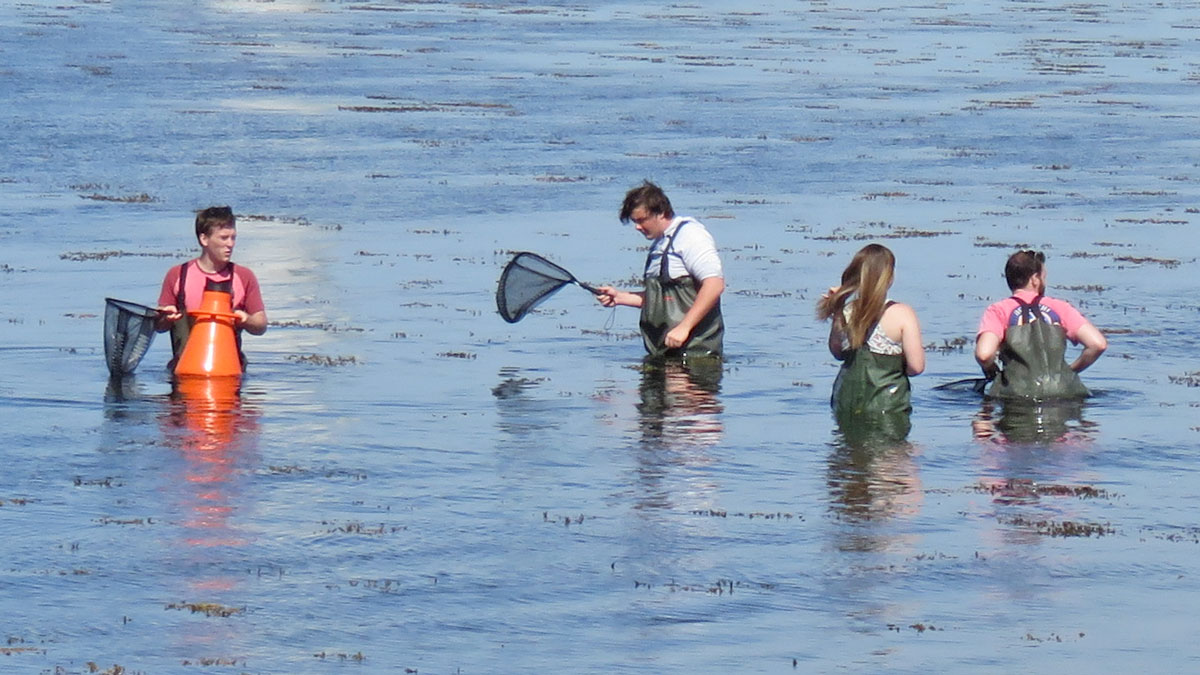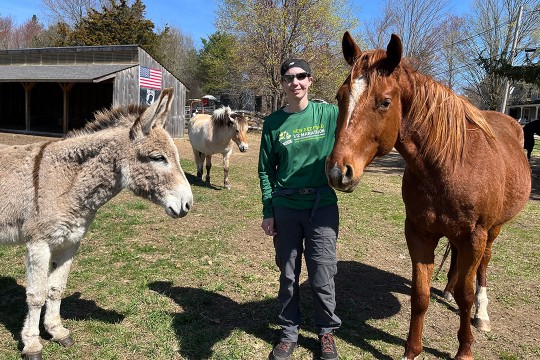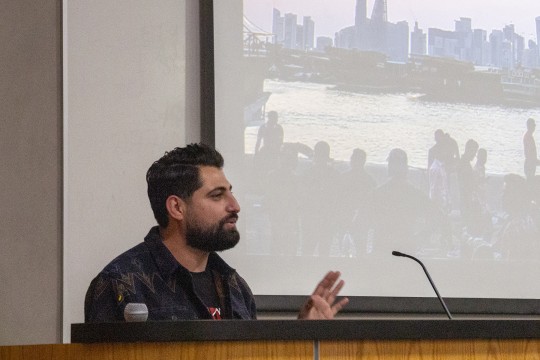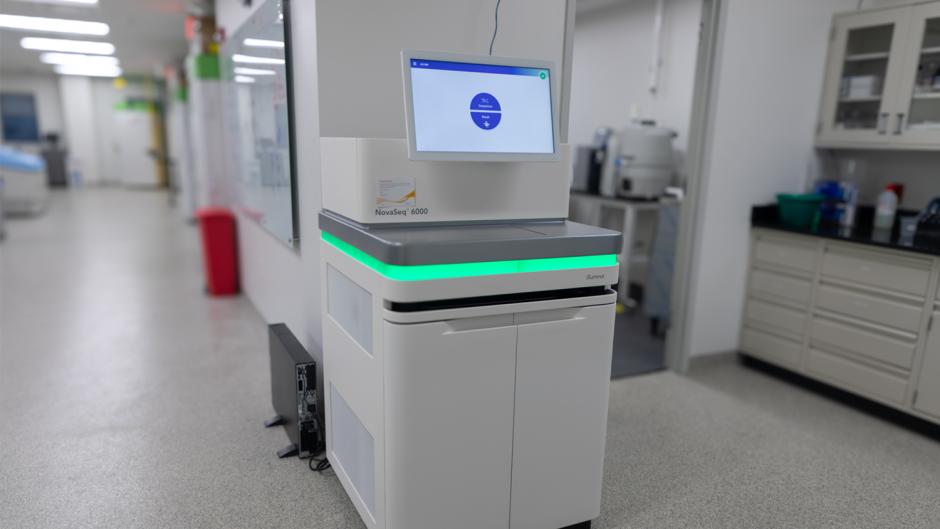Environmental Science Master of Science Degree

Environmental Science
Master of Science Degree
- RIT /
- Rochester Institute of Technology /
- Academics /
- Environmental Science MS
Overview for Environmental Science MS
STEM-OPT Visa Eligible: The STEM Optional Practical Training (OPT) program allows full-time, on-campus international students on an F-1 student visa to stay and work in the U.S. for up to three years after graduation.
A dynamic environmental science master's degree that incorporates intensive fieldwork, public policy implications, sustainable practices, and remote sensing.
Participate in a wide range of research projects including microplastics in the Great Lakes, carbon sequestration in the wetlands, degradation of blended polymers, and nitrogen removal in created wetlands.
Complete a concentration in chemistry, ecology and field biology, economics, environmental microbiology/molecular biology, Geographic Information Systems (GIS), organismal biology and evolution, public policy, remote sensing, or statistics.
Recent environmental science MS graduates have landed jobs at United Nations University, University of Rochester Medical Center, Microvi Biotechnologies Inc., The Nature Conservancy, General Dynamics, NYS Department of Environmental Conservation, United States Environmental Protection Agency, Haley and Aldrich, and LaBella Associates.
Habitat loss, global climate change, water and air pollution, ozone depletion, species invasions, loss of biodiversity, and the accumulation of toxic wastes are among the many environmental dilemmas our society faces each day. These complex problems pit environmental limits against economic development, diverse cultures, ethics, values, and social stability, and therefore require an understanding of science, policy, society, history, and economics in order to address problems realistically and effectively. Environmental scientists must use integrated and holistic approaches to understand these issues in order to identify sustainable solutions to environmental challenges.
RIT’s Environmental Science Master’s Degree
RIT’s environmental science master’s degree provides you with a deep understanding of the science behind our environmental problems, the complex set of circumstances that impact environmental issues, and how environmental decisions and policies must attempt to find a balance between environmental conservation, human well-being, and economic development. You will amplify your hands-on classroom work with an in-depth thesis or project that provides you with an opportunity to work on real-world environmental problems under the guidance of skilled environmental scientists.
The practice of environmental science demands that you become a well-rounded specialist. To accomplish this, you will complete a concentration in one of the following areas:
- Chemistry
- Ecology and field biology
- Economics
- Environmental microbiology/molecular biology
- Geographic Information Systems (GIS)
- Organismal biology and evolution
- Public policy
- Remote sensing
- Statistics
You also may develop a self-designed concentration in an area of personal interest, subject to approval from an environmental science review committee.
Students in the environmental science master's degree are working on a variety of projects:
- Conducting research in aquatic ecology studying the effects of pollution (microplastics, pharmaceuticals) and exploring remediation possibilities
- Exploring methane production in wetlands as part of global warming issues and climate change
- Looking at various methods to treat industrial wastewater, such as food processing wastewater streams from eggs, yogurt, and cheese, to reduce potential pollution issues in the environment
- Examining microbial degradation of agricultural mulches and new food packaging
- Mapping carbon dioxide emissions from trucks carrying fracking water from Pennsylvania to NY Wastewater Treatment Plants
Our environmental science master's degree incorporates intensive fieldwork, policy implications, sustainable practices, and remote sensing into the curriculum. Students benefit from collaboration with experts from RIT’s College of Science, Chester F. Carlson Center for Imaging Science, and the Golisano Institute for Sustainability.
There are two paths through the environmental science MS program, the research path and the professional path:
Research Path
The research path includes research experience and a thesis. To pursue the research path, students must have identified a faculty member who has agreed to advise them on their thesis research. A thesis involves the execution and dissemination of original research and culminates in an oral thesis defense and a written thesis dissertation.
Professional Path
The professional path includes professional coursework and a project. Students are encouraged to identify a faculty advisor for their project during the first semester. A project is typically narrower in scope than a thesis and culminates in a written report. Projects could include but are not limited to:
- Analysis and dissemination of an existing dataset
- A literature review that synthesizes information to address an environmental topic or problem
- Development and documentation of an environmental education or outreach activity, a case study, a quantitative analysis such as an environmental impact assessment or habitat suitability analysis
- An original research project with a more focused objective than a thesis.
Careers in Environmental Science
Graduates of RIT's environmental science master's program are environmental consultants or field scientists for a range of companies such as Haley and Aldrich and La Bella Associates. Several of our graduates work for the U.S. Environmental Protection Agency. Still others pursue doctoral programs in environmental science. Students can also focus on policy issues if they are interested in becoming a spokesperson for the effects of climate change and pollution on the environment. Recent environmental science MS graduates have landed jobs at United Nations University, University of Rochester Medical Center, Microvi Biotechnologies Inc., The Nature Conservancy, General Dynamics, NYS Department of Environmental Conservation, United States Environmental Protection Agency, Haley and Aldrich, and LaBella Associates.
-
Affordable Now. Valuable for Life.
Earn your master’s degree without the full price tag. With Master Up you can receive a 30% tuition scholarship for an RIT master’s degree.
-
Meet us on-campus on February 19
Learn about the programs that interest you. Hear from program faculty, speak with current graduate students, and ask the questions that will help you get one step closer to your career goals.
Careers and Cooperative Education
Typical Job Titles
| Environmental Analyst | Fish and Wildlife Tech | Field Biologist |
| Physical Scientist | GIS Analyst | Health Policy Coordinator |
Cooperative Education
What makes an RIT education exceptional? It’s the ability to complete relevant, hands-on career experience. At the graduate level, and paired with an advanced degree, cooperative education and internships give you the unparalleled credentials that truly set you apart. Learn more about graduate co-op and how it provides you with the career experience employers look for in their next top hires.
Cooperative education is optional for environmental science majors, however, it offers students a great way to get a head start on their career with paid, professional work experience. Students can participate in cooperative education as soon as the summer after their second year of study. Co-op placements are typically with local, state, or federal government agencies, nonprofit environmental organizations, and a host of environmental consulting firms.
Featured Work and Profiles
-
Tackling the Macro Problem of Microplastics
Environmental science students team up with professors to research the impact microplastics have on the ecosystem and human health.
Read More about Tackling the Macro Problem of Microplastics -
RIT Student Research Featured on the NASA Landsat Science Website
Bianca Cilento, a student at RIT, caught the attention of a program developer which led to her research work being featured on the NASA Landsat Science website.
Read More about RIT Student Research Featured on the NASA Landsat Science Website -
Dual Degree at RIT: Accelerating a Career in Veterinary Medicine
Kelsey Lawton ’21 graduated with a dual biology BS/environmental science degree and is now an in vivo toxicology technician at iuvo Bioscience, a pharmaceutical and medical device industry research...
Read More about Dual Degree at RIT: Accelerating a Career in Veterinary Medicine -
Hands-on Environmental Work Preps MS Grad for EPA
Christy Tyler Kerry Kuntz ’15 applies the same problem-solving skills she learned at RIT to her current job as a Program Analyst for the United States Environmental Protection Agency (EPA).
Read More about Hands-on Environmental Work Preps MS Grad for EPA -
A Team Experience That Pays Off In More Ways Than One
Mary Pryor The Laboratory Support Team (or BioPrep) is a unique team that gets hands-on lab experience while helping the many teaching labs in the Thomas H. Gosnell School of Life Sciences at RIT.
Read More about A Team Experience That Pays Off In More Ways Than One
Curriculum for 2025-2026 for Environmental Science MS
Current Students: See Curriculum Requirements
Students are also interested in
Admissions and Financial Aid
This program is available on-campus only.
| Offered | Admit Term(s) | Application Deadline | STEM Designated |
|---|---|---|---|
| Full‑time | Fall or Spring | Rolling | Yes |
| Part‑time | Fall or Spring | Rolling | No |
Full-time study is 9+ semester credit hours. Part-time study is 1‑8 semester credit hours. International students requiring a visa to study at the RIT Rochester campus must study full‑time.
Application Details
To be considered for admission to the Environmental Science MS program, candidates must fulfill the following requirements:
- Complete an online graduate application.
- Submit copies of official transcript(s) (in English) of all previously completed undergraduate and graduate course work, including any transfer credit earned.
- Hold a baccalaureate degree (or US equivalent) from an accredited university or college in environmental science, biological science, or a related discipline. A minimum cumulative GPA of 3.2 (or equivalent) is recommended.
- Submit a current resume or curriculum vitae.
- Submit a personal statement of educational objectives.
- Submit three letters of recommendation.
- Entrance exam requirements: GRE required for individuals with degrees from international universities
- Submit English language test scores (TOEFL, IELTS, PTE Academic, etc.), if required. Details are below.
English Language Test Scores
International applicants whose native language is not English must submit one of the following official English language test scores. Some international applicants may be considered for an English test requirement waiver.
Duolingo (DET): 120
IELTS: 6.5
LanguageCert Academic: 70
PTE Academic: 56
TOEFL: 79/4.5
International students below the minimum requirement may be considered for conditional admission. Deaf and hard-of-hearing test takers with significant hearing loss do not need to take the listening and speaking sections for the TOEFL and IELTS. Each program requires balanced sub-scores when determining an applicant’s need for additional English language courses.
How to Apply Start or Manage Your Application
Cost and Financial Aid
An RIT graduate degree is an investment with lifelong returns. Graduate tuition varies by degree, the number of credits taken per semester, and delivery method. View the general cost of attendance or estimate the cost of your graduate degree.
A combination of sources can help fund your graduate degree. Learn how to fund your degree
Accreditation
Research
Faculty in the College of Science receive grant awards from organizations such as the National Science Foundation and National Oceanic and Atmospheric Administration to provide you with unique opportunities to conduct cutting-edge graduate-level thesis research.
Environmental science faculty from the Thomas H. Gosnell School of Life Sciences conduct research on a broad variety of topics including:
- ecology and evolution
- soil science
- plastic degradation
- climate change
Learn more about these and other research priorities by exploring our life science research areas.
Related News
-
April 28, 2025

Research opportunities at RIT position grad to pursue Ph.D.
Hannah DeFelice’s research at RIT focused on how to improve animal welfare. The same research now takes her to Cornell University this fall to pursue her doctoral degree in biogeochemistry, the study of how living things interact with the physical and chemical environment.
-
April 12, 2023

Photo, science classes merge for climate change talk by Pulitzer-winning photojournalist
Salwan Georges of The Washington Post visited the RIT campus for a pair of lectures, including one that detailed his work photographing climate change for a project that received a Pulitzer Prize.
-
April 7, 2023

RIT and Seneca Park Zoo Society to host Great Lakes Plastic Cleanup event at the Port of Rochester
RIT and the Seneca Park Zoo Society will hold a special event at the Port of Rochester from 10 a.m. to noon on Saturday, April 15, to educate members of the public on how they can address plastic pollution and showcase some of the latest technology in the field.
Contact
- Lindsay Lewis
- Senior Assistant Director
- Office of Graduate Admissions
- Enrollment Management
- 585‑475‑5532
- lslges@rit.edu
- Carmody McCalley
- Associate Professor, Natural Resources Conservation
- Thomas H. Gosnell School of Life Sciences
- College of Science
- 585‑475‑6258
- ckmsbi@rit.edu
Thomas H. Gosnell School of Life Sciences






















